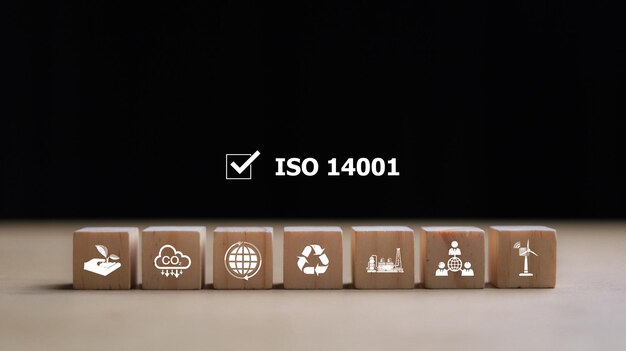
If you’re in the business world and have heard about ISO 14001, you likely know it’s all about environmental management. But did you know that ISO 14001 training can actually improve employee engagement and awareness? That’s right—training your employees in the environmental management system doesn’t just help the planet. It can also have a profound impact on your company’s culture, productivity, and overall performance.
You might be thinking, “How exactly does environmental training lead to engaged employees?” It’s a fair question. Let’s break it down and take a deeper dive into why ISO 14001 training is not just a corporate checkbox, but an invaluable tool for driving employee engagement and building a culture of environmental responsibility.
What Is ISO 14001 and Why Does It Matter?
Before we get into the “how,” let’s first establish the “what.”
ISO 14001 is part of a family of international standards designed to help organizations develop and implement an effective Environmental Management System (EMS). The goal? To manage environmental responsibilities in a way that balances environmental protection with economic performance.
In a nutshell, ISO 14001 helps businesses systematically improve their environmental performance by focusing on reducing waste, conserving energy, and preventing pollution. It’s a globally recognized standard, and earning certification tells the world that your company is committed to sustainability. But it’s not just a logo you put on your website—it’s a full-fledged system that requires buy-in from everyone in the company, from leadership to employees on the ground.
The Link Between ISO 14001 Training and Employee Engagement
Here’s the thing: employee engagement doesn’t happen overnight. It’s not just about giving employees a salary or a stack of benefits. Engagement is about getting them emotionally connected to their work, feeling like they’re part of something meaningful. When employees feel like their actions contribute to a bigger mission—whether it’s helping the planet or improving the bottom line—they’re much more likely to stay engaged and motivated.
So, how does ISO 14001 training tie into this? Let’s look at a few key reasons why it matters.
1. Empowerment Through Knowledge
Employees don’t like feeling left out of the loop. No one wants to show up to work and just punch in and out without understanding how their efforts contribute to the bigger picture. ISO 14001 training helps bridge this gap. When employees are trained in environmental management practices, they’re given the knowledge and tools they need to make real, impactful changes.
Imagine being an employee in an organization that champions sustainability, but you’re never really sure how your role fits into that mission. It’s frustrating. But when employees are properly trained in ISO 14001, they gain a clear understanding of how their actions affect the environment and the company’s overall sustainability goals.
This sense of empowerment creates ownership. When employees understand the “why” behind the decisions they make, they are much more likely to feel motivated and engaged in their work.
2. A Shared Sense of Purpose
Let’s talk about purpose for a second. Every employee wants to feel like they’re working for something meaningful, right? It’s not just about clocking in hours—it’s about contributing to something bigger than themselves.
ISO 14001 training instills a shared sense of purpose within the organization. Employees realize that they’re part of a larger effort to make the world a better place, whether that means reducing waste, conserving resources, or minimizing pollution.
It’s like this: If you tell someone, “Hey, your actions help reduce our environmental impact,” that’s nice. But if you train them to understand how, why, and where their efforts make a difference? Now they’re emotionally invested. They’ll feel proud of the role they play in the company’s mission and will naturally be more engaged in their work.
3. Fostering Collaboration and Teamwork
Here’s an interesting dynamic that ISO 14001 can bring about: cross-departmental collaboration. In many organizations, departments often work in silos. This can hinder communication, innovation, and overall effectiveness. But with ISO 14001 training, employees across different departments come together to discuss sustainability goals, identify opportunities for improvement, and implement new processes.
As employees collaborate to meet environmental objectives, they begin to see how different roles within the company interconnect. They’ll see how their colleagues’ work supports their own and how, together, they contribute to the larger sustainability goals. It’s the classic case of “many hands make light work.”
This fosters a sense of camaraderie and strengthens the overall culture within the organization. Plus, when employees from different departments come together to achieve common goals, they’re more likely to feel connected to one another—and to the organization as a whole.
4. Increased Accountability
Another crucial factor in boosting engagement is accountability. When employees know they are being held responsible for certain tasks, they’re more likely to take their work seriously. With ISO 14001 training, accountability is built right into the framework. Employees learn not just what to do, but how to monitor and track their actions to ensure that they’re meeting the company’s environmental goals.
This sense of personal responsibility—combined with the knowledge gained through training—creates a culture of accountability. Employees know they have a role to play in achieving sustainability goals, and they take that role seriously. This self-awareness leads to increased focus and effort, which ultimately drives greater engagement.
5. Continuous Learning and Growth
ISO 14001 isn’t a one-off certification. It’s an ongoing process. This continuous cycle of improvement requires constant learning, adaptation, and growth, which in turn boosts employee engagement.
Think about it: when employees are regularly trained on new processes, best practices, and the latest environmental trends, they feel like they’re always learning and evolving. This constant growth makes them feel valued and invested in their roles, preventing burnout and helping them stay engaged for the long haul.
And let’s be honest—employees love to learn. When they feel like they’re growing personally and professionally, their job feels less like a grind and more like a fulfilling journey.
6. Recognizing and Celebrating Achievements
Finally, let’s not forget about the importance of recognition. People love to feel appreciated, and ISO 14001 training offers an excellent opportunity to celebrate employee achievements. Whether it’s hitting a sustainability milestone, reducing waste, or improving energy efficiency, these accomplishments should be recognized and celebrated.
ISO 14001 gives your company the chance to highlight individual and team successes, which boosts morale and encourages further engagement. When employees feel like their contributions are noticed and valued, they’ll be more likely to stay committed to the company’s goals and mission.
Conclusion: The Power of ISO 14001 Training for Engagement
If you’re looking for ways to boost employee engagement, ISO 14001 training is a powerful tool that you can’t afford to overlook. It’s not just about creating an environmentally-friendly workplace—it’s about fostering a culture of responsibility, collaboration, and purpose that drives employee motivation and productivity.
When employees understand the importance of sustainability, feel empowered to take action, and are recognized for their contributions, they become more engaged and invested in their work. And let’s face it—engaged employees are not only more productive, but they also help create a positive work environment that leads to long-term business success.
So, the next time you think about ISO 14001, remember that it’s not just about going green. It’s about building a thriving, engaged workforce—one that feels connected to the company’s mission and eager to contribute to its success.






